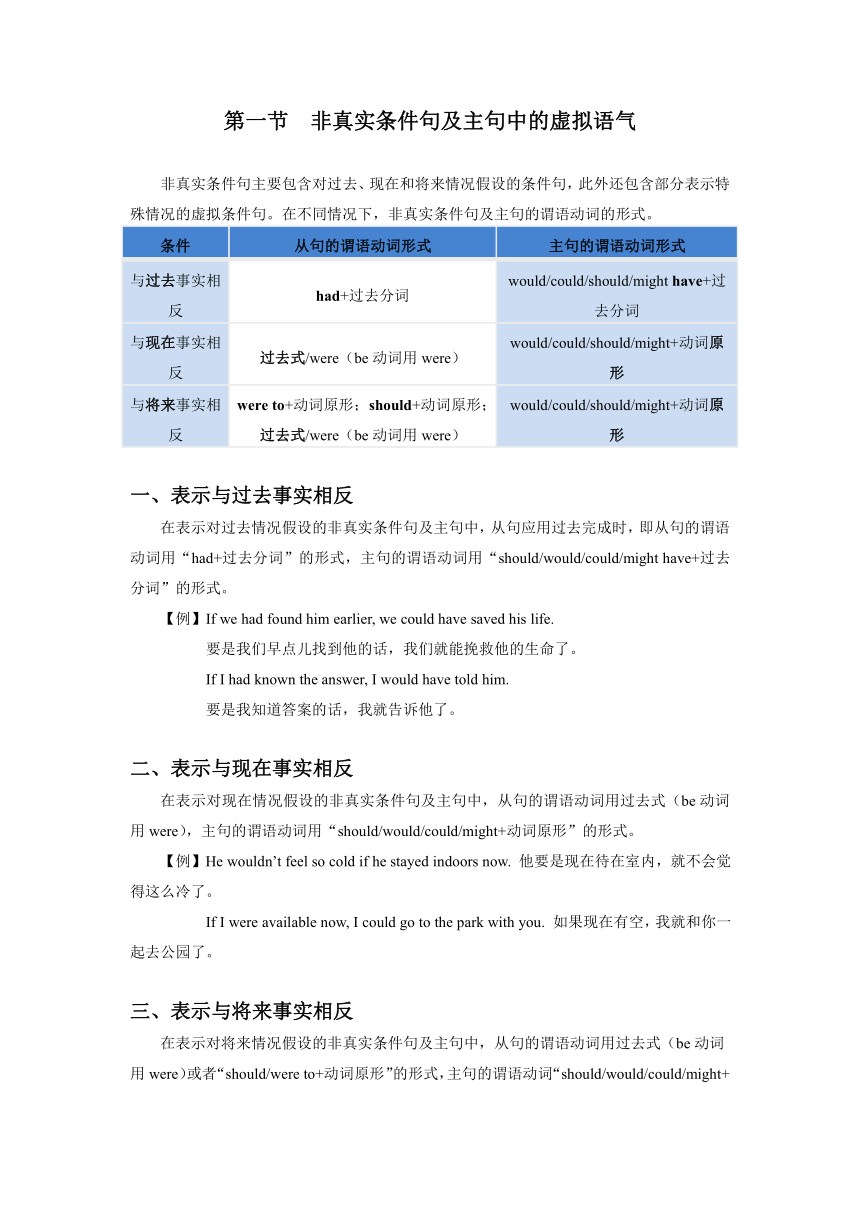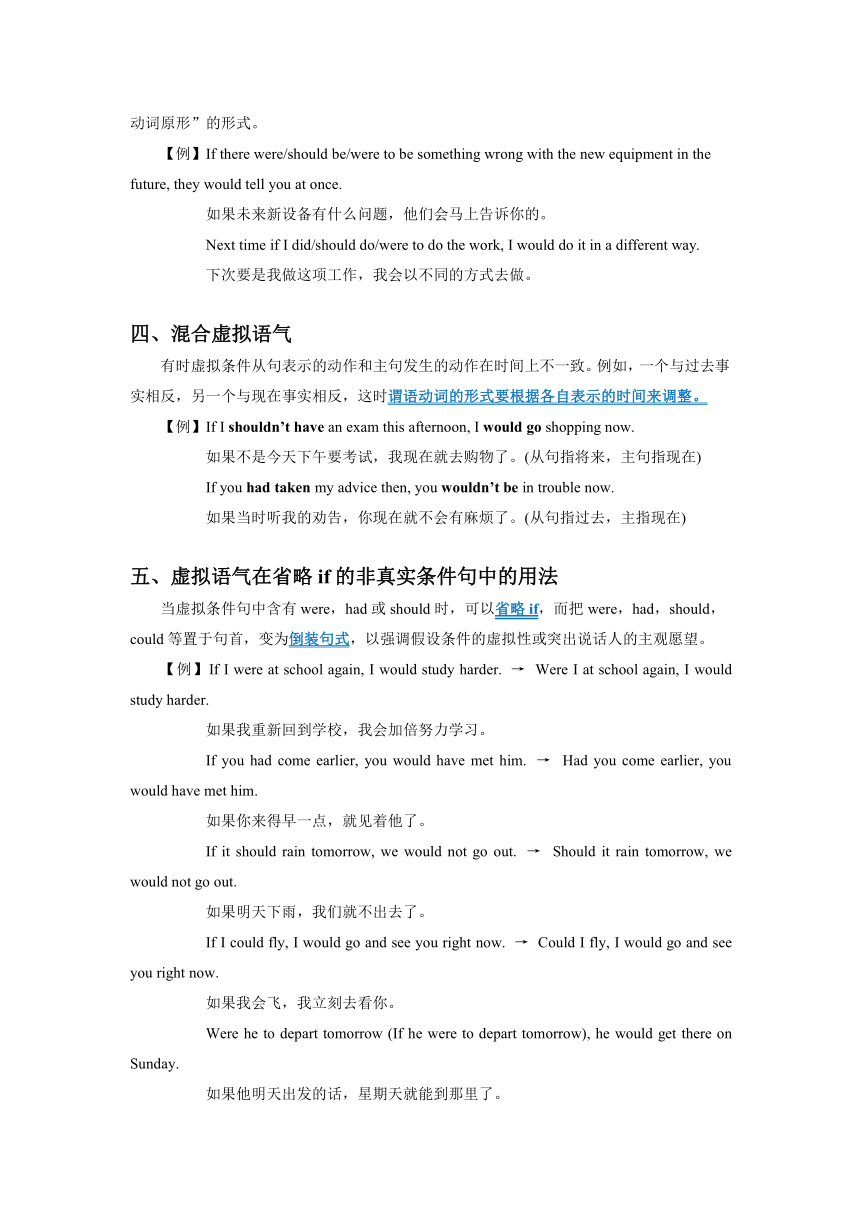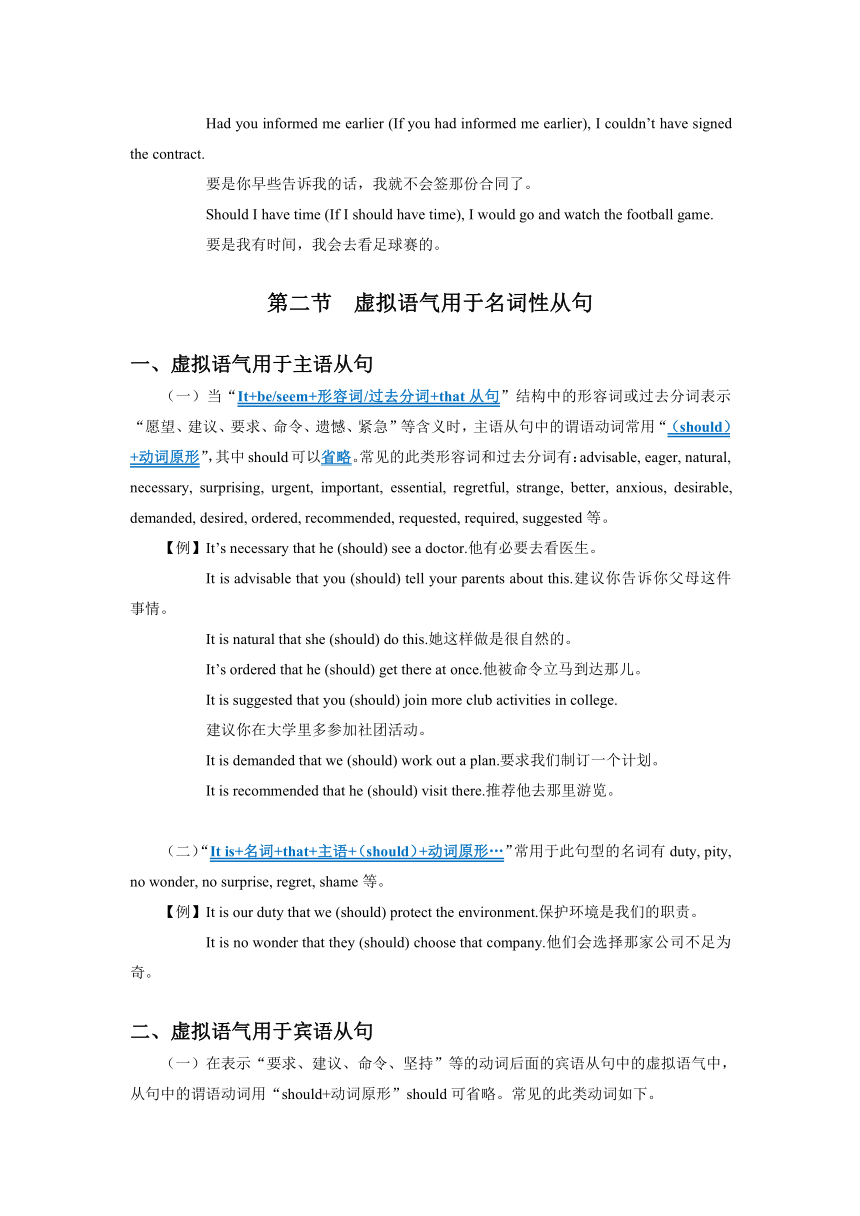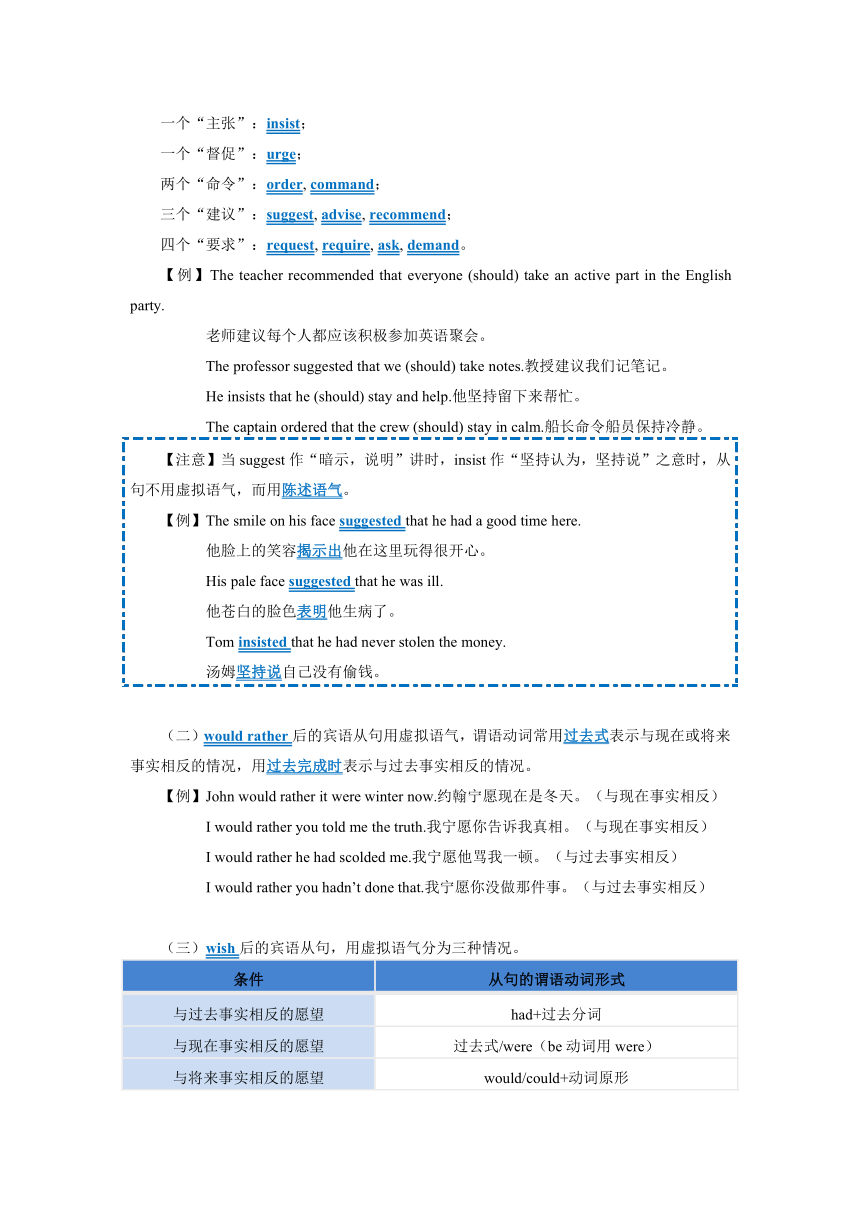2025届高三英语二轮复习专项 虚拟语气 导学案(无答案)
文档属性
| 名称 | 2025届高三英语二轮复习专项 虚拟语气 导学案(无答案) |

|
|
| 格式 | docx | ||
| 文件大小 | 32.6KB | ||
| 资源类型 | 教案 | ||
| 版本资源 | 人教版(2019) | ||
| 科目 | 英语 | ||
| 更新时间 | 2024-11-08 11:47:57 | ||
图片预览




文档简介
第一节 非真实条件句及主句中的虚拟语气
非真实条件句主要包含对过去、现在和将来情况假设的条件句,此外还包含部分表示特殊情况的虚拟条件句。在不同情况下,非真实条件句及主句的谓语动词的形式。
条件 从句的谓语动词形式 主句的谓语动词形式
与过去事实相反 had+过去分词 would/could/should/might have+过去分词
与现在事实相反 过去式/were(be动词用were) would/could/should/might+动词原形
与将来事实相反 were to+动词原形;should+动词原形; 过去式/were(be动词用were) would/could/should/might+动词原形
一、表示与过去事实相反
在表示对过去情况假设的非真实条件句及主句中,从句应用过去完成时,即从句的谓语动词用“had+过去分词”的形式,主句的谓语动词用“should/would/could/might have+过去分词”的形式。
【例】If we had found him earlier, we could have saved his life.
要是我们早点儿找到他的话,我们就能挽救他的生命了。
If I had known the answer, I would have told him.
要是我知道答案的话,我就告诉他了。
二、表示与现在事实相反
在表示对现在情况假设的非真实条件句及主句中,从句的谓语动词用过去式(be动词用were),主句的谓语动词用“should/would/could/might+动词原形”的形式。
【例】He wouldn’t feel so cold if he stayed indoors now. 他要是现在待在室内,就不会觉得这么冷了。
If I were available now, I could go to the park with you. 如果现在有空,我就和你一起去公园了。
三、表示与将来事实相反
在表示对将来情况假设的非真实条件句及主句中,从句的谓语动词用过去式(be动词用were)或者“should/were to+动词原形”的形式,主句的谓语动词“should/would/could/might+动词原形”的形式。
【例】If there were/should be/were to be something wrong with the new equipment in the future, they would tell you at once.
如果未来新设备有什么问题,他们会马上告诉你的。
Next time if I did/should do/were to do the work, I would do it in a different way.
下次要是我做这项工作,我会以不同的方式去做。
四、混合虚拟语气
有时虚拟条件从句表示的动作和主句发生的动作在时间上不一致。例如,一个与过去事实相反,另一个与现在事实相反,这时谓语动词的形式要根据各自表示的时间来调整。
【例】If I shouldn’t have an exam this afternoon, I would go shopping now.
如果不是今天下午要考试,我现在就去购物了。(从句指将来,主句指现在)
If you had taken my advice then, you wouldn’t be in trouble now.
如果当时听我的劝告,你现在就不会有麻烦了。(从句指过去,主指现在)
五、虚拟语气在省略if的非真实条件句中的用法
当虚拟条件句中含有were,had或should时,可以省略if,而把were,had,should,could等置于句首,变为倒装句式,以强调假设条件的虚拟性或突出说话人的主观愿望。
【例】If I were at school again, I would study harder. → Were I at school again, I would study harder.
如果我重新回到学校,我会加倍努力学习。
If you had come earlier, you would have met him. → Had you come earlier, you would have met him.
如果你来得早一点,就见着他了。
If it should rain tomorrow, we would not go out. → Should it rain tomorrow, we would not go out.
如果明天下雨,我们就不出去了。
If I could fly, I would go and see you right now. → Could I fly, I would go and see you right now.
如果我会飞,我立刻去看你。
Were he to depart tomorrow (If he were to depart tomorrow), he would get there on Sunday.
如果他明天出发的话,星期天就能到那里了。
Had you informed me earlier (If you had informed me earlier), I couldn’t have signed the contract.
要是你早些告诉我的话,我就不会签那份合同了。
Should I have time (If I should have time), I would go and watch the football game.
要是我有时间,我会去看足球赛的。
第二节 虚拟语气用于名词性从句
一、虚拟语气用于主语从句
(一)当“It+be/seem+形容词/过去分词+that从句”结构中的形容词或过去分词表示“愿望、建议、要求、命令、遗憾、紧急”等含义时,主语从句中的谓语动词常用“(should)+动词原形”,其中should可以省略。常见的此类形容词和过去分词有:advisable, eager, natural, necessary, surprising, urgent, important, essential, regretful, strange, better, anxious, desirable, demanded, desired, ordered, recommended, requested, required, suggested等。
【例】It’s necessary that he (should) see a doctor.他有必要去看医生。
It is advisable that you (should) tell your parents about this.建议你告诉你父母这件事情。
It is natural that she (should) do this.她这样做是很自然的。
It’s ordered that he (should) get there at once.他被命令立马到达那儿。
It is suggested that you (should) join more club activities in college.
建议你在大学里多参加社团活动。
It is demanded that we (should) work out a plan.要求我们制订一个计划。
It is recommended that he (should) visit there.推荐他去那里游览。
(二)“It is+名词+that+主语+(should)+动词原形…”常用于此句型的名词有duty, pity, no wonder, no surprise, regret, shame等。
【例】It is our duty that we (should) protect the environment.保护环境是我们的职责。
It is no wonder that they (should) choose that company.他们会选择那家公司不足为奇。
二、虚拟语气用于宾语从句
(一)在表示“要求、建议、命令、坚持”等的动词后面的宾语从句中的虚拟语气中,从句中的谓语动词用“should+动词原形”should可省略。常见的此类动词如下。
一个“主张”:insist;
一个“督促”:urge;
两个“命令”:order, command;
三个“建议”:suggest, advise, recommend;
四个“要求”:request, require, ask, demand。
【例】The teacher recommended that everyone (should) take an active part in the English party.
老师建议每个人都应该积极参加英语聚会。
The professor suggested that we (should) take notes.教授建议我们记笔记。
He insists that he (should) stay and help.他坚持留下来帮忙。
The captain ordered that the crew (should) stay in calm.船长命令船员保持冷静。
【注意】当suggest作“暗示,说明”讲时,insist作“坚持认为,坚持说”之意时,从句不用虚拟语气,而用陈述语气。
【例】The smile on his face suggested that he had a good time here.
他脸上的笑容揭示出他在这里玩得很开心。
His pale face suggested that he was ill.
他苍白的脸色表明他生病了。
Tom insisted that he had never stolen the money.
汤姆坚持说自己没有偷钱。
(二)would rather后的宾语从句用虚拟语气,谓语动词常用过去式表示与现在或将来事实相反的情况,用过去完成时表示与过去事实相反的情况。
【例】John would rather it were winter now.约翰宁愿现在是冬天。(与现在事实相反)
I would rather you told me the truth.我宁愿你告诉我真相。(与现在事实相反)
I would rather he had scolded me.我宁愿他骂我一顿。(与过去事实相反)
I would rather you hadn’t done that.我宁愿你没做那件事。(与过去事实相反)
(三)wish后的宾语从句,用虚拟语气分为三种情况。
条件 从句的谓语动词形式
与过去事实相反的愿望 had+过去分词
与现在事实相反的愿望 过去式/were(be动词用were)
与将来事实相反的愿望 would/could+动词原形
【例】I didn’t go to the party, but I do wish I had been there.
我没有去参加晚会,但是我的确希望我去参加过。
I wish I had more time for study.我多希望我有更多时间学习。
I wish that he could try again.我希望他能再试一次。
I wish (that) I were a bird.我希望自己是只鸟儿。
I wish (that) I had gone there with you.我要是和你一起去了就好啦。
I wish (that) I would/could get that job.我希望能得到那份工作。
三、虚拟语气用于表语从句和同位语从句
(一)在表示“请求、命令、建议”等含义的名词充当句子主语时,其后的表语从句或同位语从句用虚拟语气,其中从句中的谓语动词为“should+动词原形”,should可以省略,连接从句的that不能省略。常见的此类名词有advice, decision, demand, idea, order, request, suggestion等。
【例】His suggestion was that I (should) go to college.他建议我上大学。
The doctor’s advice that you (should) give up smoking is right.医生让你戒烟的建议是对的。
My advice is that we (should) work in cooperation.我的建议是大家一起来工作。
The proposal that cigarette sales (should) be restricted is approved.限制香烟销售的提案通过了。
My idea is that we (should) omit this part.我的想法是我们可以删除这部分。
(二)由as if/though引导的表语从句使用虚拟语气的情况和其引导的方式状语从句的虚拟语气的情况一样,也分为三种情况。
条件 从句的谓语动词形式
从句谓语动词先于主句谓语动词发生 had+过去分词
从句谓语动词与主句谓语动词同时发生 过去式/were(be动词用were)
从句谓语动词后于主句谓语动词发生 would/could/should/might+动词原形
【例】He looks as if he were an artist.他看上去好像是名艺术家。
【注意】as if/though也可以引导所述的是真实的或极有可能发生或存在的事实的从句,常用在连系动词look,seem,sound等词后。
【例】It looks as if it is going to rain. 看起来要下雨了。
(三)虚拟语气在would rather等后接的宾语从句中的用法
在would rather, would sooner, would (just) as soon 和would prefer等后接的宾语从句中,从句谓语动词用过去式(be动词用were)表示对现在或将来情况的假设;从句谓语动词用“had+过去分词”的形式表示对过去情况的假设,意为“宁愿,但愿”。
【例】I would rather she gave up her plan for the time being. 我宁愿她暂时放弃她的计划。
(四)虚拟语气在for fear(that), in case, lest等引导的目的状语从句中的用法
在for fear(that), in case, lest等引导的目的状语从句中,从句常用虚拟语气,从句谓语动词用“should+动词原形”的形式,表示“免得,以防,唯恐,以免”。
【例】He put on his coat for fear (that) he should catch a cold. 他穿上了外套,以防感冒。
第三节 含蓄条件句中的虚拟语气
表示假设的条件也可以隐含在介词引出的短语、分词短语或连词中,如but for, without, with, under等介词引出的短语表示虚拟条件;given等分词短语充当条件;连词but, but that, or, otherwise等表示虚拟条件等。这样的结构被称为含蓄条件句。在含蓄条件句中,如果表示对现在或将来情况的假设,谓语动词用“should/would/could/might+动词原形”的形式;如果表示对过去情况的假设,谓语动词用“should/would/could/might have+过去分词”的形式。
【例】But for a knee injury, he would have gone running. 要不是膝部有伤的话,他就去跑步了。
Given a certain opportunity, he could show more talent. 如果有机会,他会展示出更多的天赋。
第四节 其他句型中的虚拟语气
一、虚拟语气在“It is(high / about) time( that)...”句型中的用法
在“It is (high / about) time that...”句型中,后面的从句要用虚拟语气,谓语动词多用过去式;有时也用“should+动词原形”的形式,should不可省略,意为“该是······的时候了”。
【例】It’s high time that you studied/should study hard.你该努力学习了。
It’s high time that we went home.该是时候回家了。
It’s about time that you should go to school.该是时候上学了。
二、在even if引导的从句中,与现在事实相反的假设用过去式,与过去事实相反的假设用过去完成式。
【例】Even if you were here, you could not solve the problem.你在这里也解决不了问题。
Even if I had reminded you, you would not have remembered that.即使我提醒了你,你也不会记得。
三、动词hope, intend, mean, want, plan, think等用过去完成时表示“本想,本打算,本认为”。
【例】I had thought that was true.我本以为那是真的。
She had meant to apologize.她本打算道歉的。
四、“May+动词原形”表示祝愿,有时也可直接用动词原形。
【例】May you succeed! 祝你成功!
God bless you! 愿上帝保佑你!
知识巩固
一、单项选择
1.They demanded that the law on gun ownership _________.
A.changed B.be changed C.to change D.should change
2.He talked about Rome as if he __________ there himself.
A.has been B.had been C.was D.is
3.The doctor recommended that he ________ a few more days in hospital.
A.stayed B.stays C.staying D.stay
4.Without our class’s great efforts, the speech contest last week _______ such a great success.
A.wouldn’t be B.wouldn’t have been
C.must have been D.could have been
5.The new traffic law requires that everyone ________ his or her car checked at least once a year.
A.has B.had C.will have D.have
6.I wish I ______ the Great Wall with you tomorrow, but I’m preparing for the coming exam.
A.will climb B.had climbed C.climb D.would climb
7.The world today _____ different without the amazing discoveries produced by great scientists.
A.were B.had been C.would be D.would have been
8.When a pencil is partly in a glass of water, it looks as if it _______.
A.breaks B.has broken C.were broken D.had been broken
9.Sorry, I am too busy now. If I _____ time, I would certainly go for an outing with you.
A.have had B.had had C.have D.had
10.If we had not encountered a severe shortage of funds, the project______last year.
A.could finish B.would have been finished
C.would be finished D.could have finished
11.______him to go to hospital earlier, his condition wouldn’t have become worse.
A.Did I persuade B.Were I to persuade
C.If I should persuade D.Had I persuaded
12.They ordered that for every tree cut down two more____________.
A.be planted B.are planted C.should plant D.should have planted
13.It is necessary that you______gratitude when you receive a precious gift from others.
A.are expressing B.expressed
C.should express D.must express
14.She wasn’t feeling very well, otherwise she___________the lecture so early.
A.wouldn’t have left B.didn’t leave
C.could have left D.wasn’t leaving
二、语法填空
1.If I___________ (be)you, I wouldn’t wait.
2.I could___________ (do) better if I had had more time.
3.The teacher’s requirement is that we___________ (recite) the passage in 20 minutes.
4.If we___________ (book) a table earlier, we wouldn’t be standing here in the long queue now.
5.He looks as if he___________ (be) from the Mars.
6.Without air, man___________ (not exist) on the earth.
7.If he___________ (not be) ill, he would have done something to help us.
8.The teacher demand that we___________ (finish) our homework on time.
非真实条件句主要包含对过去、现在和将来情况假设的条件句,此外还包含部分表示特殊情况的虚拟条件句。在不同情况下,非真实条件句及主句的谓语动词的形式。
条件 从句的谓语动词形式 主句的谓语动词形式
与过去事实相反 had+过去分词 would/could/should/might have+过去分词
与现在事实相反 过去式/were(be动词用were) would/could/should/might+动词原形
与将来事实相反 were to+动词原形;should+动词原形; 过去式/were(be动词用were) would/could/should/might+动词原形
一、表示与过去事实相反
在表示对过去情况假设的非真实条件句及主句中,从句应用过去完成时,即从句的谓语动词用“had+过去分词”的形式,主句的谓语动词用“should/would/could/might have+过去分词”的形式。
【例】If we had found him earlier, we could have saved his life.
要是我们早点儿找到他的话,我们就能挽救他的生命了。
If I had known the answer, I would have told him.
要是我知道答案的话,我就告诉他了。
二、表示与现在事实相反
在表示对现在情况假设的非真实条件句及主句中,从句的谓语动词用过去式(be动词用were),主句的谓语动词用“should/would/could/might+动词原形”的形式。
【例】He wouldn’t feel so cold if he stayed indoors now. 他要是现在待在室内,就不会觉得这么冷了。
If I were available now, I could go to the park with you. 如果现在有空,我就和你一起去公园了。
三、表示与将来事实相反
在表示对将来情况假设的非真实条件句及主句中,从句的谓语动词用过去式(be动词用were)或者“should/were to+动词原形”的形式,主句的谓语动词“should/would/could/might+动词原形”的形式。
【例】If there were/should be/were to be something wrong with the new equipment in the future, they would tell you at once.
如果未来新设备有什么问题,他们会马上告诉你的。
Next time if I did/should do/were to do the work, I would do it in a different way.
下次要是我做这项工作,我会以不同的方式去做。
四、混合虚拟语气
有时虚拟条件从句表示的动作和主句发生的动作在时间上不一致。例如,一个与过去事实相反,另一个与现在事实相反,这时谓语动词的形式要根据各自表示的时间来调整。
【例】If I shouldn’t have an exam this afternoon, I would go shopping now.
如果不是今天下午要考试,我现在就去购物了。(从句指将来,主句指现在)
If you had taken my advice then, you wouldn’t be in trouble now.
如果当时听我的劝告,你现在就不会有麻烦了。(从句指过去,主指现在)
五、虚拟语气在省略if的非真实条件句中的用法
当虚拟条件句中含有were,had或should时,可以省略if,而把were,had,should,could等置于句首,变为倒装句式,以强调假设条件的虚拟性或突出说话人的主观愿望。
【例】If I were at school again, I would study harder. → Were I at school again, I would study harder.
如果我重新回到学校,我会加倍努力学习。
If you had come earlier, you would have met him. → Had you come earlier, you would have met him.
如果你来得早一点,就见着他了。
If it should rain tomorrow, we would not go out. → Should it rain tomorrow, we would not go out.
如果明天下雨,我们就不出去了。
If I could fly, I would go and see you right now. → Could I fly, I would go and see you right now.
如果我会飞,我立刻去看你。
Were he to depart tomorrow (If he were to depart tomorrow), he would get there on Sunday.
如果他明天出发的话,星期天就能到那里了。
Had you informed me earlier (If you had informed me earlier), I couldn’t have signed the contract.
要是你早些告诉我的话,我就不会签那份合同了。
Should I have time (If I should have time), I would go and watch the football game.
要是我有时间,我会去看足球赛的。
第二节 虚拟语气用于名词性从句
一、虚拟语气用于主语从句
(一)当“It+be/seem+形容词/过去分词+that从句”结构中的形容词或过去分词表示“愿望、建议、要求、命令、遗憾、紧急”等含义时,主语从句中的谓语动词常用“(should)+动词原形”,其中should可以省略。常见的此类形容词和过去分词有:advisable, eager, natural, necessary, surprising, urgent, important, essential, regretful, strange, better, anxious, desirable, demanded, desired, ordered, recommended, requested, required, suggested等。
【例】It’s necessary that he (should) see a doctor.他有必要去看医生。
It is advisable that you (should) tell your parents about this.建议你告诉你父母这件事情。
It is natural that she (should) do this.她这样做是很自然的。
It’s ordered that he (should) get there at once.他被命令立马到达那儿。
It is suggested that you (should) join more club activities in college.
建议你在大学里多参加社团活动。
It is demanded that we (should) work out a plan.要求我们制订一个计划。
It is recommended that he (should) visit there.推荐他去那里游览。
(二)“It is+名词+that+主语+(should)+动词原形…”常用于此句型的名词有duty, pity, no wonder, no surprise, regret, shame等。
【例】It is our duty that we (should) protect the environment.保护环境是我们的职责。
It is no wonder that they (should) choose that company.他们会选择那家公司不足为奇。
二、虚拟语气用于宾语从句
(一)在表示“要求、建议、命令、坚持”等的动词后面的宾语从句中的虚拟语气中,从句中的谓语动词用“should+动词原形”should可省略。常见的此类动词如下。
一个“主张”:insist;
一个“督促”:urge;
两个“命令”:order, command;
三个“建议”:suggest, advise, recommend;
四个“要求”:request, require, ask, demand。
【例】The teacher recommended that everyone (should) take an active part in the English party.
老师建议每个人都应该积极参加英语聚会。
The professor suggested that we (should) take notes.教授建议我们记笔记。
He insists that he (should) stay and help.他坚持留下来帮忙。
The captain ordered that the crew (should) stay in calm.船长命令船员保持冷静。
【注意】当suggest作“暗示,说明”讲时,insist作“坚持认为,坚持说”之意时,从句不用虚拟语气,而用陈述语气。
【例】The smile on his face suggested that he had a good time here.
他脸上的笑容揭示出他在这里玩得很开心。
His pale face suggested that he was ill.
他苍白的脸色表明他生病了。
Tom insisted that he had never stolen the money.
汤姆坚持说自己没有偷钱。
(二)would rather后的宾语从句用虚拟语气,谓语动词常用过去式表示与现在或将来事实相反的情况,用过去完成时表示与过去事实相反的情况。
【例】John would rather it were winter now.约翰宁愿现在是冬天。(与现在事实相反)
I would rather you told me the truth.我宁愿你告诉我真相。(与现在事实相反)
I would rather he had scolded me.我宁愿他骂我一顿。(与过去事实相反)
I would rather you hadn’t done that.我宁愿你没做那件事。(与过去事实相反)
(三)wish后的宾语从句,用虚拟语气分为三种情况。
条件 从句的谓语动词形式
与过去事实相反的愿望 had+过去分词
与现在事实相反的愿望 过去式/were(be动词用were)
与将来事实相反的愿望 would/could+动词原形
【例】I didn’t go to the party, but I do wish I had been there.
我没有去参加晚会,但是我的确希望我去参加过。
I wish I had more time for study.我多希望我有更多时间学习。
I wish that he could try again.我希望他能再试一次。
I wish (that) I were a bird.我希望自己是只鸟儿。
I wish (that) I had gone there with you.我要是和你一起去了就好啦。
I wish (that) I would/could get that job.我希望能得到那份工作。
三、虚拟语气用于表语从句和同位语从句
(一)在表示“请求、命令、建议”等含义的名词充当句子主语时,其后的表语从句或同位语从句用虚拟语气,其中从句中的谓语动词为“should+动词原形”,should可以省略,连接从句的that不能省略。常见的此类名词有advice, decision, demand, idea, order, request, suggestion等。
【例】His suggestion was that I (should) go to college.他建议我上大学。
The doctor’s advice that you (should) give up smoking is right.医生让你戒烟的建议是对的。
My advice is that we (should) work in cooperation.我的建议是大家一起来工作。
The proposal that cigarette sales (should) be restricted is approved.限制香烟销售的提案通过了。
My idea is that we (should) omit this part.我的想法是我们可以删除这部分。
(二)由as if/though引导的表语从句使用虚拟语气的情况和其引导的方式状语从句的虚拟语气的情况一样,也分为三种情况。
条件 从句的谓语动词形式
从句谓语动词先于主句谓语动词发生 had+过去分词
从句谓语动词与主句谓语动词同时发生 过去式/were(be动词用were)
从句谓语动词后于主句谓语动词发生 would/could/should/might+动词原形
【例】He looks as if he were an artist.他看上去好像是名艺术家。
【注意】as if/though也可以引导所述的是真实的或极有可能发生或存在的事实的从句,常用在连系动词look,seem,sound等词后。
【例】It looks as if it is going to rain. 看起来要下雨了。
(三)虚拟语气在would rather等后接的宾语从句中的用法
在would rather, would sooner, would (just) as soon 和would prefer等后接的宾语从句中,从句谓语动词用过去式(be动词用were)表示对现在或将来情况的假设;从句谓语动词用“had+过去分词”的形式表示对过去情况的假设,意为“宁愿,但愿”。
【例】I would rather she gave up her plan for the time being. 我宁愿她暂时放弃她的计划。
(四)虚拟语气在for fear(that), in case, lest等引导的目的状语从句中的用法
在for fear(that), in case, lest等引导的目的状语从句中,从句常用虚拟语气,从句谓语动词用“should+动词原形”的形式,表示“免得,以防,唯恐,以免”。
【例】He put on his coat for fear (that) he should catch a cold. 他穿上了外套,以防感冒。
第三节 含蓄条件句中的虚拟语气
表示假设的条件也可以隐含在介词引出的短语、分词短语或连词中,如but for, without, with, under等介词引出的短语表示虚拟条件;given等分词短语充当条件;连词but, but that, or, otherwise等表示虚拟条件等。这样的结构被称为含蓄条件句。在含蓄条件句中,如果表示对现在或将来情况的假设,谓语动词用“should/would/could/might+动词原形”的形式;如果表示对过去情况的假设,谓语动词用“should/would/could/might have+过去分词”的形式。
【例】But for a knee injury, he would have gone running. 要不是膝部有伤的话,他就去跑步了。
Given a certain opportunity, he could show more talent. 如果有机会,他会展示出更多的天赋。
第四节 其他句型中的虚拟语气
一、虚拟语气在“It is(high / about) time( that)...”句型中的用法
在“It is (high / about) time that...”句型中,后面的从句要用虚拟语气,谓语动词多用过去式;有时也用“should+动词原形”的形式,should不可省略,意为“该是······的时候了”。
【例】It’s high time that you studied/should study hard.你该努力学习了。
It’s high time that we went home.该是时候回家了。
It’s about time that you should go to school.该是时候上学了。
二、在even if引导的从句中,与现在事实相反的假设用过去式,与过去事实相反的假设用过去完成式。
【例】Even if you were here, you could not solve the problem.你在这里也解决不了问题。
Even if I had reminded you, you would not have remembered that.即使我提醒了你,你也不会记得。
三、动词hope, intend, mean, want, plan, think等用过去完成时表示“本想,本打算,本认为”。
【例】I had thought that was true.我本以为那是真的。
She had meant to apologize.她本打算道歉的。
四、“May+动词原形”表示祝愿,有时也可直接用动词原形。
【例】May you succeed! 祝你成功!
God bless you! 愿上帝保佑你!
知识巩固
一、单项选择
1.They demanded that the law on gun ownership _________.
A.changed B.be changed C.to change D.should change
2.He talked about Rome as if he __________ there himself.
A.has been B.had been C.was D.is
3.The doctor recommended that he ________ a few more days in hospital.
A.stayed B.stays C.staying D.stay
4.Without our class’s great efforts, the speech contest last week _______ such a great success.
A.wouldn’t be B.wouldn’t have been
C.must have been D.could have been
5.The new traffic law requires that everyone ________ his or her car checked at least once a year.
A.has B.had C.will have D.have
6.I wish I ______ the Great Wall with you tomorrow, but I’m preparing for the coming exam.
A.will climb B.had climbed C.climb D.would climb
7.The world today _____ different without the amazing discoveries produced by great scientists.
A.were B.had been C.would be D.would have been
8.When a pencil is partly in a glass of water, it looks as if it _______.
A.breaks B.has broken C.were broken D.had been broken
9.Sorry, I am too busy now. If I _____ time, I would certainly go for an outing with you.
A.have had B.had had C.have D.had
10.If we had not encountered a severe shortage of funds, the project______last year.
A.could finish B.would have been finished
C.would be finished D.could have finished
11.______him to go to hospital earlier, his condition wouldn’t have become worse.
A.Did I persuade B.Were I to persuade
C.If I should persuade D.Had I persuaded
12.They ordered that for every tree cut down two more____________.
A.be planted B.are planted C.should plant D.should have planted
13.It is necessary that you______gratitude when you receive a precious gift from others.
A.are expressing B.expressed
C.should express D.must express
14.She wasn’t feeling very well, otherwise she___________the lecture so early.
A.wouldn’t have left B.didn’t leave
C.could have left D.wasn’t leaving
二、语法填空
1.If I___________ (be)you, I wouldn’t wait.
2.I could___________ (do) better if I had had more time.
3.The teacher’s requirement is that we___________ (recite) the passage in 20 minutes.
4.If we___________ (book) a table earlier, we wouldn’t be standing here in the long queue now.
5.He looks as if he___________ (be) from the Mars.
6.Without air, man___________ (not exist) on the earth.
7.If he___________ (not be) ill, he would have done something to help us.
8.The teacher demand that we___________ (finish) our homework on time.
